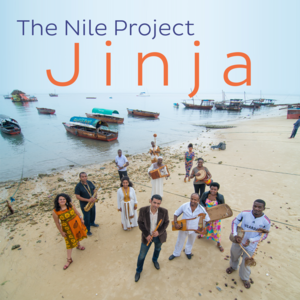The Nile Project encompasses a big idea: fostering solidarity among a hugely diverse set of peoples and societies living on or near the world’s second largest river. Environmental stewardship is central to the mission, complicated by the fact that 11 ethnically and politically different nations must cooperate to keep the river healthy. But here’s the kicker: The active ingredient in this monumental endeavor is music. Every year or so, musicians selected from these 11 countries gather in retreats to co-compose and prepare a touring concert that then ventures out into the world, raising consciousness to promote the health of the Nile. (For more on the project’s workings, check out the Afropop program "Inside the Nile Project.")
By the time the musicians on this album began recording during their 2016 U.S. tour, the ensemble’s 15 or so musicians had become a band, even a family, well accustomed to each others' variant musical ways, and delighting in finding ways to compliment and interact with one another. The album is significantly deeper and more settled than the Nile Project’s 2013 album Aswan, a live recording from the inaugural Nile Concert tour. The sessions on Jinja were largely done in makeshift hotel room studios, sometimes with mattresses set against the windows and walls. But no matter. The sound is excellent, and more to the point, the performances brim with a spirit of excitement and innovation.
The opener, “Ingani,” begins with solo plucking on the Rwandan enanga (a large, lap-held harp) by Sophie Nzayisenga. As other instruments enter—jangly Ethiopian krar, Egyptian oud and flute (kawala), and a variety of percussion—the song moves into a propulsive jam in a minor mode. There are lots of percolating 12/8 rhythms combined with brooding musical modes in these 10 diverse tracks. In all its variations, this combination of urgent energy and pensive gravitas works well, communicating the Nile Project’s animating mood of celebration and solemnity.
But even without all the environmental and cultural context, this is a terrifically engaging album in strictly musical terms. “Ya Abai Wuha” showcases a searing Ethiopian vocal by Selamnesh Zemene, backed by a strong female chorus. The song lifts from moody balladry to a rollicking dance groove. “Omwiga” begins with solo riffing on a buzzy Ugandan harp and a craggy male vocal, but when the ensemble pounces in in support, the song blooms into a celebratory gallop. As textures shift and arrangements move through organic twists and turns, the music here unfolds like a page-turning novel—sonic storytelling at its best.
Two longer pieces stand out. “Dil Mahbuby” opens with nearly three minutes of solo oud virtuosity by Mohamed Abozekry of Egypt. As the piece moves into a stately ensemble composition, fellow Egyptian Dina El Wedidi eases in with a vocal that merges subtle evocations of Umm Kulthum with a kind of pent-up punk rock vibe. The song crescendos in an explosive, all-out jam featuring El Wedidi’ s voice as a lead instrument before dropping satisfyingly back to the composition. “Tenseo” plays on a similarity between an Egyptian and an Ethiopian scale. Here, intense female vocal passages are interspersed with lengthy oud and saxophone (Jorga Mesfin, Ethiopia) solos, all culminating in an ecstatic uptempo finish.
Jinja also flows deep into East Africa. “Biwelewele” builds from a lamellophone riff and powerful, raspy vocal by Stephen Sogo of Burundi. When the ensemble joins in, it comfortably lifts Sogo’s rootsy root to a kind of orchestral glory. The closer, “Mulungi Munange,” has the vibe of a classic Sudanese love song—foursquare rhythm and major key harmony—but all the flavors of this extraordinary collaboration find their voice in the mix, wrapping up perhaps the most successful musical release from this part of Africa to hit the international market in many years.








